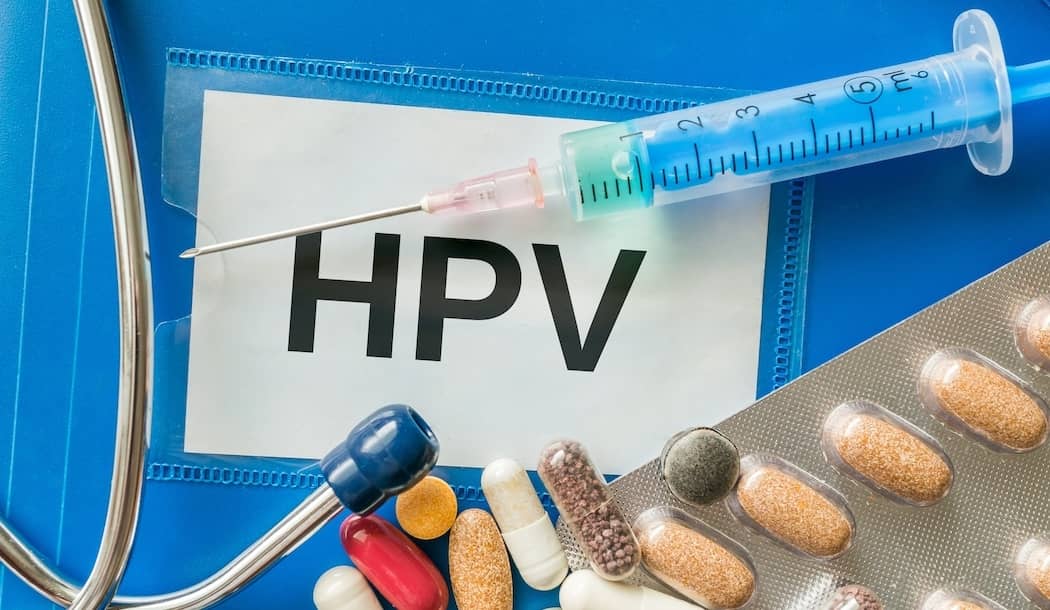
Most people who are infected with the world’s most common sexually transmitted infection (STI) aren’t even aware they have it. That means the human papillomavirus (HPV) can easily spread like wildfire. While HPV may not cause visible symptoms in some people, it can cause different cancers in numerous locations in the body.
If you’ve ever been sexually active, here’s what you need to know.
What exactly is HPV?
HPV is a class of viruses that includes up to 150 strains. More than 30 of those are sexually transmitted. HPV is often considered a hidden disease because it resides in the skin and mucous membranes. In fact, papilloma means “small wart-like growth on the skin or mucous membrane.” Some of those infected will experience visible growths, known as genital warts, while others will not.
Most people contract HPV through sexual intercourse or genital contact. HPV is spread through vaginal, anal, and oral sex and most important, transmission can happen whether or not the person who has the infection shows any signs or symptoms.
HPV is so prevalent that experts say eight out of ten people will be infected at some point in their lives. An estimated thirteen million Americans contract new HPV infections per year.
In 2018, the CDC reported that about 48 million people were infected. Many of them were in their teens and twenties when the infections took place.
HPV’s connection to deadly cancers
Low-risk HPV infections can cause external genital warts. For example, HPV6 and HPV11 strains are responsible for approximately 90 percent of all genital warts. They’re rarely linked to pre-cancerous lesions or cancer in the body.
Fortunately, most of those infected are seemingly able to clear the infection without health issues. Having said that, 35,000 men and women do get HPV-related cancers each year in the U.S.
High-risk HPV strains that aren’t cleared by your immune system can lead to cancers of the cervix, anus, vagina, vulva, penis and throat (oropharynx).
Researchers have identified 14 of the most common cancer-causing HPV strains which include 16, 18, 31, 33, 35, 39, 45, 51, 52, 56, 58, 59, 66, and 68. In fact, types 16 and 18 account for nearly 70 percent of invasive cervical cancers. Type 16 is also strongly linked to anal cancer and throat cancer.
Cervical cancer and how to protect yourself
A test called a Pap Smear detects abnormal or precancerous cells in the cervix in the early stages. Women should receive an annual Pap Smear even if they’ve been vaccinated with Gardasil—a relatively new vaccine that protects against some HPV strains. That’s right, Gardasil does not protect against every HPV strain that leads to cancer, which is why testing is so important.
If a woman’s Pap Smear test shows cellular abnormalities, then certain protocols exist to test for HPV infection. Fortunately, roughly 90 percent of women with the virus will clear the infection without interference. The remainder will develop persistent infection that leads to abnormalities (called dysplasia) in their cervical cells.
Research suggests that it takes 15 to 20 years for cancer to develop in women with strong immune systems, and just five to ten years in women with weakened immune systems. The immune system is so important that women with HIV are six times more likely to get cervical cancer than those without HIV, according to the World Health Organization.
If you have any of the following symptoms, get tested for cervical cancer even if you’ve received the HPV Gardasil vaccine:
- Irregular blood spotting or light bleeding between periods (even if you’re of reproductive age)
- Postmenopausal spotting/bleeding
- Bleeding after sexual intercourse
- Increased vaginal discharge, sometimes foul-smelling
- Weight loss, fatigue, loss of appetite
- Persistent back, leg, and/or pelvic pain
- Swelling of one or both legs
- Vaginal discomfort
Signs and symptoms of oral cancer
Researchers report that 70 percent of oral cancer cases in the U.S. are linked to HPV. As cases rise, oral cancer has become the most common HPV-related cancer in the country. Most oral (oropharyngeal) cancers start in the throat, in the tonsils or back of the tongue.
Traditional risk factors include drinking alcohol, smoking, and chewing tobacco. As the evidence grows linking oral cancer to sexually transmitted HPV, oral sex is believed to be the main route of exposure.
We wrote about oral cancers recently in Cancer Defeated Issue #1167.
Other HPV-related cancers include…
Anal cancer... over 90 percent of anal cancer cases are caused by HPV. Cancer.gov reports that cases of and deaths from anal cancer are on the rise. Anal cancer is almost twice as common in women as it is in men. Signs of anal cancer include anal or rectal bleeding, pain near the anus, a mass or growth, and anal itching.
Vaginal cancer... 75 percent are caused by HPV. Most vaginal cancers don’t show early symptoms. Symptoms to watch for include vaginal discharge or bleeding that’s abnormal for you, a change in bathroom habits (bleeding, frequency, or constipation), or pain in your pelvis.
Vulvar cancer... 70 percent of vulvar cancers are caused by HPV. Signs to be aware of include persistent itching, burning or bleeding of the vulva, skin or color changes in the vulva, persistent sores and lumps on the vulva, and pelvic pain.
Penile cancer... 60 percent of penile cancers are caused by HPV. It’s a rare type of cancer affecting the tip of the penis. Early signs might include changes in skin color, a lump or sore, a red velvety rash under the foreskin, small crusty bumps, or a smelly discharge. The sores or lumps usually don’t hurt. So, get checked even if there’s no pain.
How to minimize your risk of HPV
No matter your age, getting a new sexual partner is a major risk factor for a new HPV infection. Remember, even if you already have the virus, you can still pick up another strain that could cause cancer. While condoms can reduce your risk of contracting HPV, they won’t eliminate the risk completely. Abstinence and long-term monogamy are the best defense against contracting any HPV virus and related cancers.
It’s important to also remember that, as with any illness, keeping your immune system in tip-top shape will help prevent HPV complications and HPV-related cancers.
The foundation of a healthy immune system is a diet rich in fruits and vegetables, lean meats, and healthy fats. Avoid processed foods and refined sugars, excess alcohol consumption and a high-stress lifestyle. Focus on a balanced lifestyle that includes stress management techniques, regular sleep and exercise.
Best regards,

Lee Euler,
Publisher
References:
- https://www.cancer.gov/about-cancer/causes-prevention/risk/infectious-agents/hpv-and-cancer
- https://www.cdc.gov/std/hpv/stdfact-hpv.htm
- https://www.hpv.org.nz/about-hpv/hpv-strains
- https://www.hpv.org.nz/about-hpv/hpv-other-cancers
- https://www.hpv.org.nz/about-hpv/about-hpv
- https://www.mdanderson.org/publications/focused-on-health/Common-HPV-questions-
answered.h31Z1590624.html - https://www.cancerresearchuk.org/about-cancer/causes-of-cancer/infections-eg-hpv-and-
cancer/does-hpv-cause-cancer - https://www.oncolink.org/risk-and-prevention/sexual-history-human-papillomavirus-hpv/hpv-
and-cancer-risk - https://www.scientificamerican.com/article/1-in-4-couples-share-hpv/
- https://www.who.int/news-room/fact-sheets/detail/human-papillomavirus-(hpv)-and-cervical-cancer
- https://www.houstonmethodist.org/blog/articles/2021/aug/will-hpv-go-away-and-5-other-questions-
you-may-have-answered/


